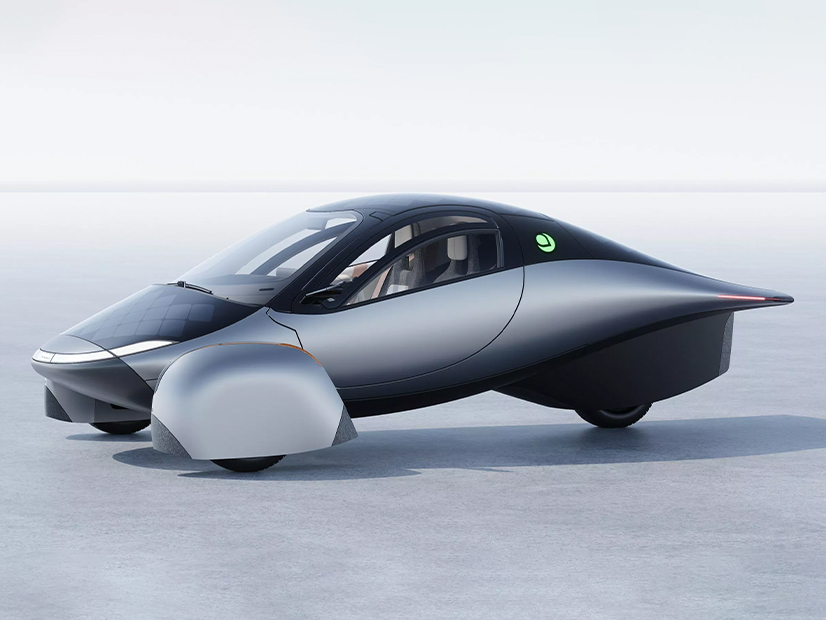The California Energy Commission on Wednesday continued its recent practice of making large grants to in-state manufacturers of zero-emission vehicles, including futuristic three-wheeled cars with built-in solar panels and hydrogen-powered big rigs.
The CEC awarded Aptera Motors Corp. $22 million to “produce an affordable solar ZEV that uses the sun to fuel up to a 40-mile daily commute without the need for grid-connected charging,” the agency said in a grant document.
The car’s range on a plug-in charge is up to 1,000 miles in a version with the most battery capacity, Aptera says on its website. Other versions can reach 250, 400 and 600 miles on a charge, the company says.
“That looks like a Jetsons kind of [vehicle]. Is that something that is capable of going freeway speeds?” CEC Chair David Hochschild asked Pablo Ucar, Aptera’s vice president of production and procurement.
The car’s top speed is 110 mph, “so it drives like a real vehicle,” Ucar said. “The reason it is a three-wheeler is because we want it to be the most efficient vehicle in the world. Three wheels are more efficient than four wheels. It is a two-passenger vehicle. It performs and behaves like a regular car on the highway.”
The CEC grant, matched by $26.4 million from Aptera, will pay for installing vehicle production equipment at two manufacturing facilities in Carlsbad and Vista, California, cities in San Diego County.
The vehicle is on preorder and expected to be available to buyers later this year. Aptera plans to produce 20,000 vehicles annually by 2025 and to create 444 manufacturing jobs, the CEC said.
Commissioner Patty Monahan, the lead commissioner for transportation programs, acknowledged Aptera’s car is unlike anything on the road in the U.S. and involves uncertainty. But one of the CEC’s goals is to encourage new concepts in zero-emission vehicles from companies such as Aptera, she said.
“We’re taking calculated risks in terms of really wanting to support innovation in the ZEV ecosystem and recognizing that electrification offers this opportunity to be really innovative,” Monahan said.
The CEC approved a $9 million grant to Symbio North America, with a company match of nearly $11 million, to expand its facility in Poway, also in San Diego County, and to establish a new facility in Temecula, in Riverside County, for hydrogen fuel cell vehicle power systems and vehicle assembly. The expansion will create 63 jobs and establish a hydrogen fuel cell workforce training program in partnership with nearby universities and colleges, the company said.
“These California facilities will assemble regional long-haul heavy-duty fuel cell class 8 trucks and have an annual combined maximum production capacity of 250 trucks and 250 to 300 fuel cell power systems to expedite fuel cell truck deployment in California,” the grant request said.
Hochschild asked Symbio North America General Manager Rob Del Core how the company’s big rigs would compare with battery-powered electric trucks being produced by Tesla and others.
“We’re looking at applications where a hydrogen fuel cell could really dominate in terms of the benefits for things like fast-fueling, long range and of course payload capacity,” Del Core said.
That will include trucks that can travel 400 miles from Southern to Northern California without refueling on a route with 70 mph highway speeds and a winding 4,000-foot mountain pass.
The CEC’s grants are part of a major push to encourage ZEV manufacturing and job creation in California using funds allocated by state budgets in 2021 and 2022.
As of January, CEC staff had recommended 13 projects for funding totaling $199.4 million.
Last month the CEC awarded more than $46 million in grants to four manufacturers of electric tractors, forklifts, car batteries, and charging stations with the intent to bolster in-state production of zero-emission vehicles and equipment.
Ranging from about $8 million to more than $14 million, the grants were among the largest manufacturing subsidies ever granted by the CEC. (See CEC Awards $46 Million for ZEV Manufacturing.)



